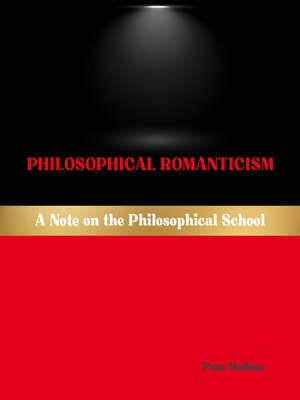Philosophical Romanticism
audiobook (Unabridged) ∣ A Note on the Philosophical School · Western Philosophical Schools
By Pons Malleus

Sign up to save your library
With an OverDrive account, you can save your favorite libraries for at-a-glance information about availability. Find out more about OverDrive accounts.
Find this title in Libby, the library reading app by OverDrive.



Search for a digital library with this title
Title found at these libraries:
| Library Name | Distance |
|---|---|
| Loading... |
This audiobook is narrated by a digital voice.
This audiobook arises from a desire to revisit and reexamine one of the most passionate, complex, and oft-misunderstood traditions in the history of philosophy: Philosophical Romanticism. Born in the aftermath of the Enlightenment, Romanticism emerged not merely as a reaction to rationalism, empiricism, and mechanistic science, but as a deep and enduring reorientation of thought—one that insisted on the irreducibility of human experience, the primacy of imagination, and the centrality of the individual in the making of meaning. This was not a retreat into sentiment or unreason, as caricatures sometimes suggest, but rather a philosophical project grounded in a profound interrogation of reason's limits and a radical affirmation of life in all its contradictions.
Philosophical Romanticism is not a school in the formal sense. It has no definitive canon, no singular methodology, and no authoritative voice. It is better understood as a constellation of thinkers—such as Friedrich Schlegel, Novalis, Schelling, and Coleridge—who were united less by dogma than by sensibility. Their writings span literature, science, politics, theology, and metaphysics, and their insights cannot be neatly contained within disciplinary boundaries. This is part of what makes Romanticism so compelling: it is porous, experimental, and alive with tensions. At its core lies a philosophical ambition to think beyond the binary oppositions that often shape Western thought—reason and feeling, nature and culture, self and world—and to move instead toward a vision of unity-in-difference, of the infinite disclosed through the finite.







